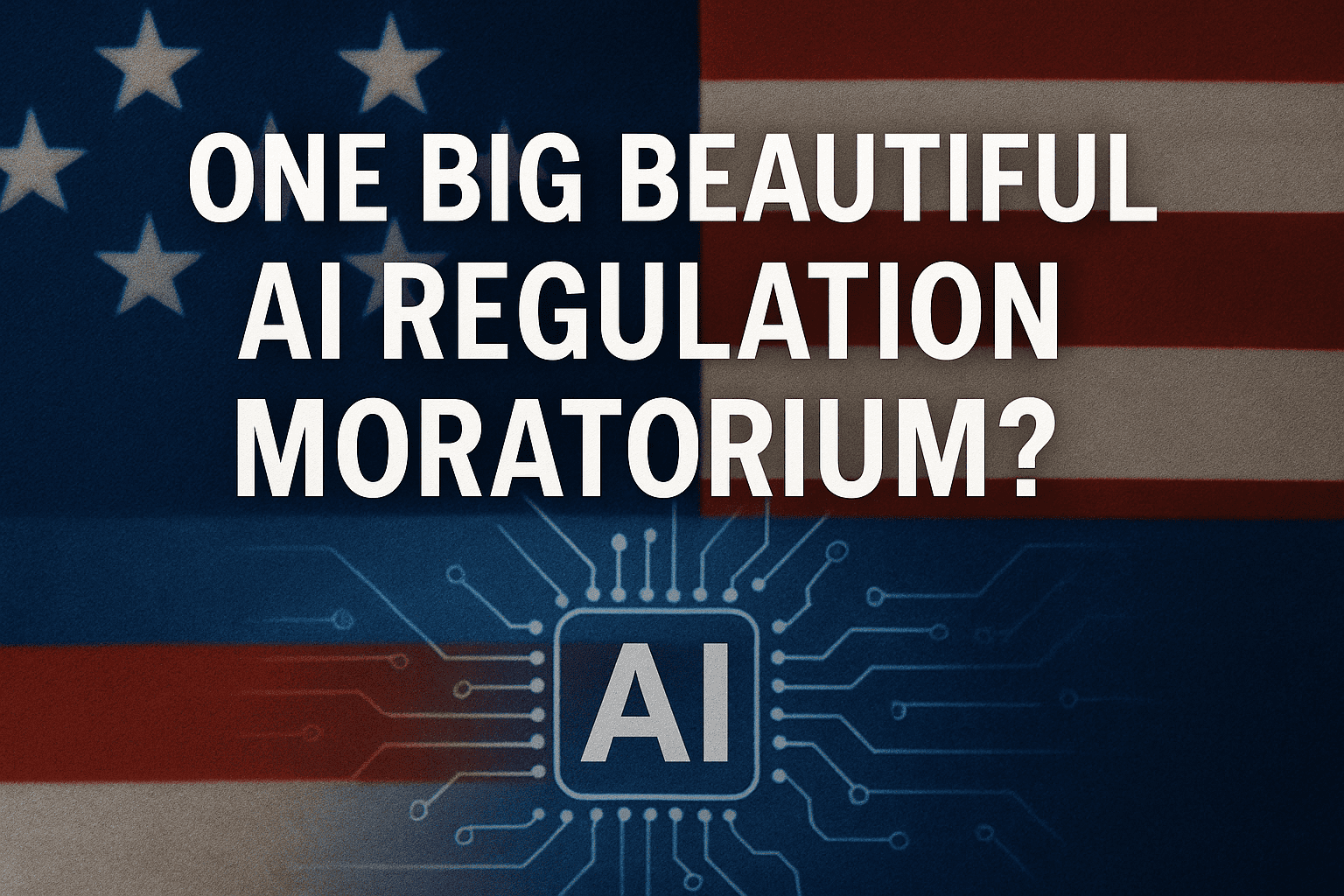Insider Brief
- The “One Big Beautiful Bill Act,” passed by the House in May 2025, includes a controversial 10-year moratorium on state-level AI regulation, sparking bipartisan backlash and growing opposition from governors, attorneys general, and public interest groups.
- Supporters, including Google, OpenAI, and the U.S. Chamber of Commerce, argue that centralizing AI oversight fosters innovation and avoids a regulatory patchwork, but critics warn it undermines state autonomy, nullifies 149 state laws, and leaves consumers vulnerable to AI-related harms.
- With public opinion turning against the moratorium and key Republican lawmakers negotiating amendments, a Senate vote expected by early July may alter the scope or duration of the provision, shaping the future of U.S. AI governance.
The “One Big Beautiful Bill Act“, a Republican-led legislative package, includes a controversial provision to prohibit states from regulating artificial intelligence (AI) for a decade. Passed by the U.S. House of Representatives in May 2025 with a narrow 215-214 vote, the bill is now under Senate consideration, with a vote expected by early July 2025, according to Congress.gov. The moratorium aims to centralize AI oversight at the federal level, but its broad scope has sparked intense debate. Supporters, including tech giants like Google and OpenAI, argue it fosters innovation, while critics, including state officials and advocacy groups, warn it risks consumer safety and state autonomy. Recent developments, such as a potential agreement to shorten the moratorium, suggest the provision may evolve, as reported by Politico. This article explores the moratorium’s scope, arguments for and against it, public sentiment, affected state laws, recent developments, and broader implications.
Scope of the AI Moratorium
The moratorium, embedded in Section 43201(c) of the bill, prohibits states and localities from regulating AI models, systems, or automated decision-making for a decade. It would nullify at least 149 existing state laws, including Tennessee’s ELVIS Act, which protects artists from AI-generated deepfakes and California’s regulations on AI companion platforms, acccording to NBC News. The provision also ties state compliance to federal broadband funding under the Broadband, Equity, Access, and Deployment (BEAD) program, pressuring states to forgo AI regulation to secure funds, Poynter points out.. With no federal AI regulatory framework in place, critics warn of a potential regulatory vacuum that could expose consumers to AI-related harms.
Table: Key Stakeholders and Positions
Supporters’ Perspective
| Stakeholder Group | Position | Key Arguments |
|---|---|---|
| Tech Companies (e.g., Google, OpenAI) | Support | Boosts innovation, prevents regulatory fragmentation, supports U.S. competitiveness. |
| U.S. Chamber of Commerce | Support | Uniform federal rules aid business clarity and global leadership. |
| Advocacy Groups (e.g., Common Sense Media) | Oppose | Risks consumer safety, blocks protections against AI harms. |
| State Officials (40 AGs, 260 legislators) | Oppose | Undermines state autonomy, nullifies existing laws. |
| Republican Lawmakers (e.g., Hawley, Blackburn) | Oppose | Concerns over child safety, consumer rights, and federal overreach. |
| Republican Governors (e.g., Sanders) | Oppose | Hinders states’ ability to protect citizens from AI harms. |
| Public (per Echelon Insights poll) | Oppose | Prefers state-level oversight to address AI risks promptly. |
Proponents, including tech giants like Google, Microsoft, and OpenAI, as well as the U.S. Chamber of Commerce, argue that the moratorium will drive AI innovation and maintain U.S. competitiveness, particularly against global rivals like China U.S. Chamber. They contend that a patchwork of state laws creates compliance challenges for businesses, hindering development. OpenAI’s CEO, Sam Altman, has advocated for lighter regulations to spur commercial AI growth, according to The Wrap. Supporters also assert that the moratorium provides Congress time to craft a unified federal AI policy, though no draft legislation has been proposed.
Opponents, including 77 advocacy organizations like Common Sense Media, Fairplay, and the Center for Humane Technology, have labeled the moratorium a “Trojan horse” that prioritizes corporate interests over consumer safety, Common Sense Media reports. Experts like Amba Kak from the AI Now Institute warn that states face a dilemma, choosing between broadband funding and protecting constituents from AI harms, such as discriminatory hiring tools, deepfakes, and addictive chatbots Poynter. A bipartisan group of 40 state attorneys general and 260 state legislators have urged Congress to reject the moratorium, arguing it undermines their ability to protect residents State AGs. Even within the Republican Party, opposition is notable. Senators Josh Hawley, Jerry Moran, Ron Johnson, and Marsha Blackburn, along with Representative Marjorie Taylor Greene, have criticized the provision, citing risks to child safety, consumer rights, and state autonomy, NBC News reported.
“I am adamantly OPPOSED to this and it is a violation of state rights and I would have voted NO if I had known this was in there,” Green posted on X. “We have no idea what AI will be capable of in the next 10 years and giving it free rein and tying states hands is potentially dangerous.”
Last week, a group of 17 Republican governors asked Senate Majority Leader John Thune and Speaker Mike Johnson on Friday to remove a 10-year moratorium on enforcing state and local artificial intelligence laws from the GOP’s megabill, Polictico reported.
Since then, there seems to have been some headway from Republican supporters off the bill, with supporter Sen. Ted Cruz and Blackburn reaching a “potential truc”, Politico reported over the weekend.
According to CNN, critics also draw parallels to past federal inaction on social media regulation, which allowed harms like misinformation to flourish unchecked.
Public Opinion
Public sentiment strongly leans against the moratorium. A poll conducted by Echelon Insights for Common Sense Media in mid-May 2025 found that 59% of registered voters, including 50% of Republicans, oppose the 10-year ban on state AI regulation. The survey revealed that 53% of respondents trust state and local leaders more than federal politicians to regulate AI effectively, with only 15% favoring Washington, D.C.-based regulators. Over 90% expressed concern about children’s exposure to highly sexualized AI-generated content, underscoring public demand for robust protections.
Latest Developments
As of June 30, 2025, the Senate is actively deliberating the bill, with recent developments indicating potential changes to the AI moratorium. Senators Marsha Blackburn and Ted Cruz, who have publicly held opposing views, have reached a tentative agreement to shorten the moratorium, though specifics remain undisclosed, according to Politico. Additionally, a group of Republican governors, led by Arkansas Governor Sarah Huckabee Sanders, has called on Congress to remove the AI regulatory moratorium, arguing it would hinder states’ ability to protect their citizens. The Senate parliamentarian has ruled that the moratorium complies with reconciliation rules, allowing it to pass with a simple majority, as reported by PYMNTS. The Senate aims to finalize the vote by early July 2025 to avoid a debt default, according to the USA Today.
Legal and Sectoral Implications
The moratorium’s broad definition of “automated decision systems” could disrupt regulatory oversight in sectors like finance, healthcare, education, and insurance. An exemption for that apply equally to non-AI systems introduces ambiguity, likely sparking litigation over enforcement, according to the AP . For businesses, the moratorium offers regulatory clarity but risks delaying critical consumer safeguards, particularly for vulnerable communities.
Broader Context
The debate underscores a broader tension between fostering AI innovation and ensuring consumer protections. Critics argue that the absence of a federal alternative repeats past regulatory failures, such as those seen with social media, which allowed harms like misinformation to flourish unchecked, CNN reports. The moratorium’s outcome will shape the U.S. AI regulatory landscape for years, with significant implications for technology policy and consumer safety.
With 59% of voters opposing the 10-year ban and Senate negotiations hinting at a possible compromise, the bill’s fate remains uncertain. As AI continues to reshape industries and society, the outcome of this debate will have lasting implications for governance and accountability. For more information, readers can explore the bill’s full text on Congress.gov, follow updates from reputable sources like NBC News, or review advocacy perspectives from organizations such as Common Sense Media.






